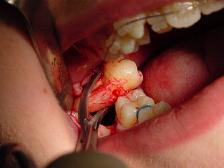Dental extraction
(Redirected from Odontectomy)
Definition[edit | edit source]
Exodontia/Dental Extraction can be defined as painless removal of a tooth or tooth root from its socket with minimal injury to the bone and surrounding structure so that postoperative healing is uneventful.
Dentistry is one of the fastest growing science of medicine. With the introduction of many newer instruments and anesthesia, extraction is a routinely carried out procedure in dental office. Tooth extraction remains an essential component of both the art and science of dentistry despite the enormous progress in the prevention of dental disease made during the last three decades of the twentieth century. The effect of the fluoride revolution and increasing public awareness of oral health means that people in the western world are retaining their teeth longer and fewer teeth are being extracted, particularly in adolescents and young adults. This trend towards the retention of the natural dentition into later life is resulting in more extractions being needed in older patients, who have more complicated medical history and bone is more brittle than the young. Thus, the difficulty and complexity of extraction procedures is increasing with the average age of our patients.
Dental surgeons, especially those in practice, are required to face these challenges in medico-legal climate in which litigation exists when complications arise for whatever reason. It is therefore more important that the principles and techniques of removing teeth are understood by all those in the dental profession who would pick up a pair of extraction forceps.
Having a tooth extracted may also pose a daunting challenge to patients whose imagination of what is to happen are often governed by misbeliefs, others experience and existing social taboos could get the better of them. Calm, reassuring approach by the dental surgeon whilst explaining the procedure goes a long way towards allowing such fears and building their confidence. The successful outcome of tooth extraction depends not only on the surgeon's practical skills, but also on his or her ability to emphasize with patients and the way they perceive the problem.
The extraction of tooth is a surgical procedure involving bony and soft tissue of oral cavity, access to which is restricted by the lips and cheeks and further complicated by the movement of tongue and mandible. An additional hazard is that this cavity communicates with pharynx which in turn opens into larynx and oesophagus. Further this field of operation is flooded by saliva and inhabited by the largest number and variety of microorganisms. Finally it lies close to the vital centres. It is therefore essential that this aspect of oral surgery be properly understood judiciously performed and be based on sound surgical principles as it applies to any other part of human body. No operation performed by the dentist is fraught with such great danger to the patient as those of oral surgery, a large part of which is the extraction of teeth.
While the great majority of extractions can be done in the dental office, some patients require hospitalization for this surgery because of predisposing systemic conditions which increases the surgical risks.
Dental extraction has always been considered to be an unpleasant procedure for the patients due to pain phobia. With the advent of local anesthetic drugs techniques and standardization of surgical procedure, extraction is no longer considered to be painful experience to the patients. Gone are the days when extraction was supposed to be one of the crude procedure.
The control of the patient is fear and anxiety has long been a challenge to the dental practitioner. Today's extraction procedure is painless and anxiety-free provided that one employs good principles of patient management and pharmacokinetics.
Search WikiMD
Ad.Tired of being Overweight? Try W8MD's physician weight loss program.
Semaglutide (Ozempic / Wegovy and Tirzepatide (Mounjaro / Zepbound) available.
Advertise on WikiMD
|
WikiMD's Wellness Encyclopedia |
| Let Food Be Thy Medicine Medicine Thy Food - Hippocrates |
Translate this page: - East Asian
中文,
日本,
한국어,
South Asian
हिन्दी,
தமிழ்,
తెలుగు,
Urdu,
ಕನ್ನಡ,
Southeast Asian
Indonesian,
Vietnamese,
Thai,
မြန်မာဘာသာ,
বাংলা
European
español,
Deutsch,
français,
Greek,
português do Brasil,
polski,
română,
русский,
Nederlands,
norsk,
svenska,
suomi,
Italian
Middle Eastern & African
عربى,
Turkish,
Persian,
Hebrew,
Afrikaans,
isiZulu,
Kiswahili,
Other
Bulgarian,
Hungarian,
Czech,
Swedish,
മലയാളം,
मराठी,
ਪੰਜਾਬੀ,
ગુજરાતી,
Portuguese,
Ukrainian
Medical Disclaimer: WikiMD is not a substitute for professional medical advice. The information on WikiMD is provided as an information resource only, may be incorrect, outdated or misleading, and is not to be used or relied on for any diagnostic or treatment purposes. Please consult your health care provider before making any healthcare decisions or for guidance about a specific medical condition. WikiMD expressly disclaims responsibility, and shall have no liability, for any damages, loss, injury, or liability whatsoever suffered as a result of your reliance on the information contained in this site. By visiting this site you agree to the foregoing terms and conditions, which may from time to time be changed or supplemented by WikiMD. If you do not agree to the foregoing terms and conditions, you should not enter or use this site. See full disclaimer.
Credits:Most images are courtesy of Wikimedia commons, and templates, categories Wikipedia, licensed under CC BY SA or similar.
Contributors: Bonnu

